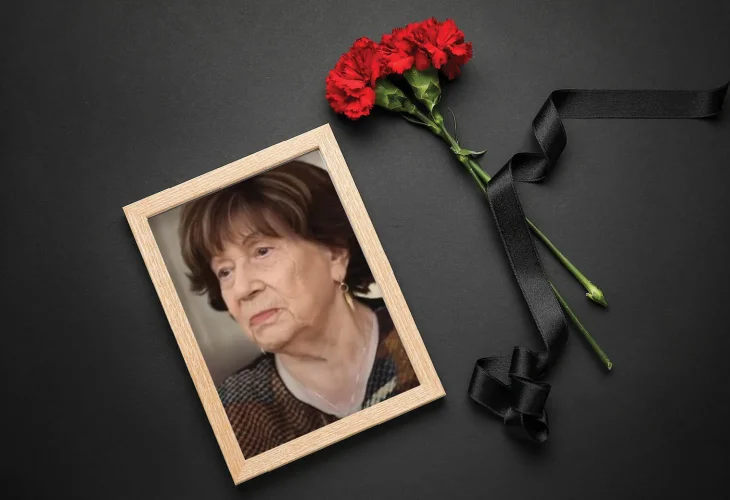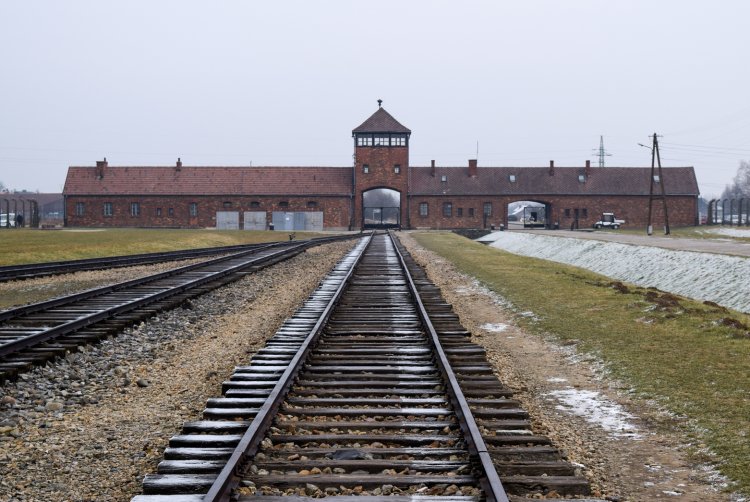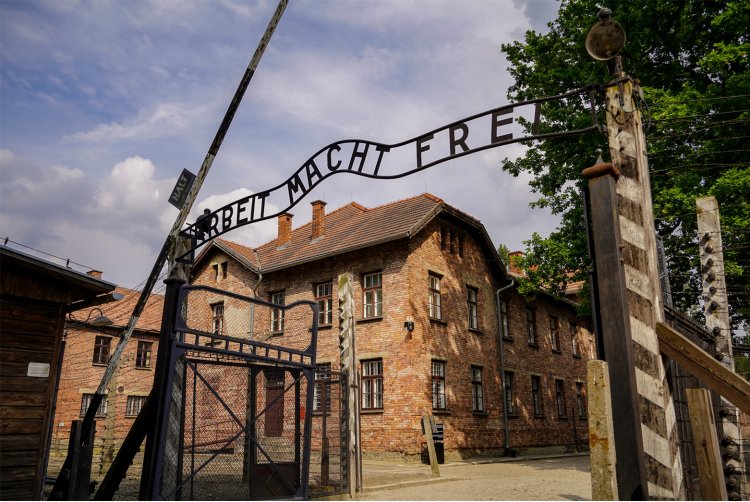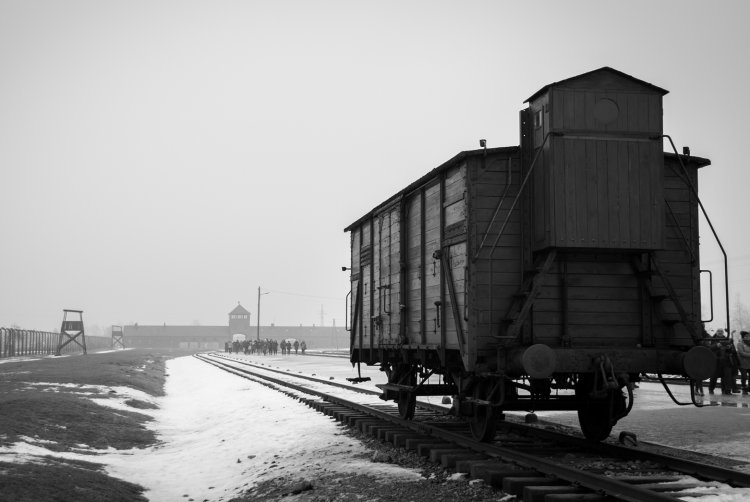A Legacy of Courage: Shindy Miller's Holocaust Diary
From the horrors of Auschwitz, amidst hunger, disease, and forced labor, Shindy Miller documented the atrocities of the Holocaust with every fiber of her being. Written on hidden scraps of paper, her diary became a chilling testament and legacy for future generations. Now, two months after her passing, her daughter Dori unveils her inspiring story.

"It's hard to write with black ink on white paper. It would have been more fitting to write with the dripping blood of my heart - drop by drop."
These words were penned by Shindy Miller in 1944 as she and her family were deported to the death camps. Born in 1930, Shindy lived in Galanta, now part of Slovakia. As the Germans invaded Hungary, approximately 437,000 Jews from the region, including Shindy's family, were sent to Auschwitz-Birkenau.
She endured a year-long journey of hardship until the war's end, working with her sister in forced labor at a munitions factory. There, amidst grueling 12-hour shifts, filled with hunger and illness, Shindy continued her diary, documenting from the day the Germans occupied Hungary until the war ceased.
 (Photo: Shutterstock)
(Photo: Shutterstock)A Warm and Joyful Home
Shindy Miller (née Arnovald) was the tenth of twelve children. At 14, when the Germans seized Hungary, she was uprooted with her family, eventually sent to Auschwitz. Shindy's entire family, except her older sister Yeti who was with her, and her brother taken earlier to a labor camp, were murdered there.
Her diary, originally written in Hungarian and later translated into Hebrew, English, and German, tells of their ordeal. Yet, despite this, her daughter Dori surprises when she says, "My mother was always a happy woman. From the time I remember to when she passed away two months ago at 96. She loved life, invested in herself and our home, and I can unequivocally say, we grew up in a very joyful home."
Reflecting on her childhood, Dori shares: "For years, we lived in the Sanhedria neighborhood in a shared apartment with Yeti, my mom's older sister, who survived with her. Both were married post-war, made Aliyah with their surviving brother, and frequently hosted guests from Galanta, reminiscing about the past and present but never discussing the Holocaust. The topic was never broached; when it was mentioned, they'd immediately stop talking and go home."
Did you ever ask your mother about her experiences as a child?
"I never asked because I understood we weren't supposed to. Mom silently conveyed a clear message: 'Don't ask questions,' and so we didn't. Today, I realize it was out of her protective nature for us. This concern showed in various ways, like when we'd go on class trips, and neighbors told us she'd wait by the building entrance from 6 PM, hours before our expected return. Her wartime fears and anxieties stayed with her, worrying constantly for our safety."
Besides Dori, Shindy had two sons, but tragedy struck the family when the middle son died in the army. "He was the child most connected to mom," Dori explains. "She worried about him endlessly, poured her soul into him, and when he died, the indescribable pain was palpable. I feared for mom's strength, thinking she'd break. Yet, to our amazement, right after the mourning period, she got ready, put on her makeup, maintained her elegant appearance, and went grocery shopping. She explained, 'I don't want pity.' She returned to her work as a seamstress. That was mom—stronger than steel, which explains how she survived the Holocaust and built a warm, happy home despite unimaginable losses."
 (Photo: Shutterstock)
(Photo: Shutterstock)A Diary for the Ages
You mentioned your mother didn’t share much of her memories. When did you discover her diary then?
"As a young woman, I heard stories and details sparingly. The moment of true revelation came with the birth of her grandchildren. By then, mom spoke of the diary and even showed it to those interested, though she hadn’t yet published or printed it.
"Those days marked the start of her public talks about her life story. She became a sought-after speaker, regularly guiding at Yad Vashem and lecturing at schools, seminars, universities, the air force, and pre-military programs everywhere. The significant impact of her narrative and the understanding that this was a way to preserve Holocaust memory propelled her to continue despite the immense effort it required."
And then, according to Dori, it was the diary’s turn. "I personally became acquainted with mom’s diary as a teenager. She'd read me sections in Hungarian, sharing her life story that way. But what catapulted its fame was fate’s guiding hand," she shares emotionally while detailing its journey.
"A Swiss man once visited seeking information on people from Galanta, having heard about mom's survival. She mentioned the diary during the conversation, and upon returning to Switzerland, he saw a German newspaper claiming all Holocaust survivors had perished. This deeply unsettled him, prompting him to inform the newspaper: 'There’s a woman in Jerusalem who survived and even kept a diary.' Fascinated, the newspaper staff came to meet my mom. They examined her diary and discovered the papers were from a German factory still in operation. They requested the diary pages for verification. The factory identified them, but their chilling reaction was: 'She stole them from us.' Mom decided then that publishing the diary was essential, ensuring the Holocaust can never be denied."
What did she say about her urgency to write?
"It wasn’t just an urge; it was risking her life. Had the diary been discovered in its hiding place by her bunk, it could have ended horribly. But mom explained she witnessed the annihilation of her people, with over 50% of Hungarian Jews murdered within a year and a half. At just 14, she understood documenting was the only way to record their ordeal. She began in a notebook; when they moved, she tore out pages and clumped them into a ball, keeping it through the years. In the factory, she transcribed her diary onto cards, continuing until the war ended."
Dori highlights her mother’s challenges during her factory labor. "One was parting with their younger sister, Dori, for whom I’m named. The Germans promised she’d go somewhere with more food. Reluctantly, they agreed, but regretted it ever since. My aunt would lament decades later, 'Why did I let her go?'"
Are there any diary entries that touched you deeply?
"Many. One describes mom gazing from a train window, seeing grass and life outside while crammed inside a wagon, barely able to breathe. Yet, the thought of life after the war bolstered her will to survive.
"Another reveals being ill but avoiding the hospital, knowing it meant death. Her sister and friend sandwiched her between them, ensuring she didn’t fall. Later, the camp's kapo developed a soft spot for mom, providing medicine named 'quinine,' which helped her recover and survive."
Shindy’s diary published 65 years post-war gained widespread acclaim, its vivid narrative bringing her experiences to life. Shindy was consequently invited for numerous talks, continuing until age ninety.
"Mom concluded every lecture stating, 'I defeated the Germans,'" shares Dori, "proudly adding, 'I have seven grandchildren, all studying, and I’m very proud.' Sometimes, I’d ask her, 'Aren’t you afraid to say that?' even in non-religious settings. But mom, ever resilient, replied, 'Why fear? I speak the truth, as my grandchildren, yeshiva students, carry forward our parents' legacy.'"
 (Photo: Shutterstock)
(Photo: Shutterstock)Continuing the Legacy
But the diary’s story holds a chilling continuation. "One day, we received an invitation to Germany," Dori recalls, "realizing mom’s diary was to be exhibited at the German History Museum in Berlin, marking 75 years since Auschwitz's liberation. Alongside were family items that survived, like candlesticks from her grandmother, buried by her parents before leaving their home. After the war, mom remembered where they were hidden and found them.
"For this occasion, mom traveled to Germany, speaking eloquently while admonishing Germans of their ancestors' deeds, warning them never to forget. Later, we were invited again for a film premiere on mom’s life story, receiving regal treatment, even Germany’s chancellor attended to greet her."
Amidst this, a profound moment occurred. "One film editor, a key production figure, asked mom: 'How did you stay a believing Jew after all you endured?' She replied, 'Precisely because of my experiences, I feel it a mission to continue my parents' ways.' Noticing his tears, mom asked: ‘Why are you crying?’ He confessed: 'I’m Jewish too and sharing this is a first for me.' I don't know his fate, but mom certainly touched countless hearts. May her memory be blessed."
Special thanks to Mrs. Nava Weiss, Head of the Orthodox Division at Yad Vashem, for her significant assistance in preparing this article.

